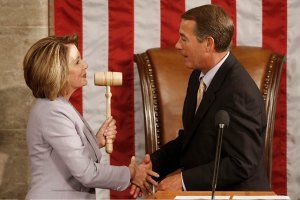
The 2010 congressional midterm elections are less than four months away, and while the Senate will almost certainly remain in Democratic hands, the House of Representatives is up for grabs. If the Republicans pick up 38 seats, as some analysts predict, then John Boehner of Ohio replaces Nancy Pelosi of California as speaker of the House. This would produce a huge change in American politics.
When another branch of government requiring a vote of the people—the presidency—was at stake, the country saw the candidates up close in a series of debates. Why should the leadership of Congress be any different? Between now and November, we need debates between the parties' candidates for speaker of the House. The voters deserve no less.
Don't members of Congress debate all the time on the floor? Not really. Instead they give short speeches with no interaction, no questions, and almost no one listening. Pelosi-Boehner debates, by contrast, would become special cable (and even possibly network) events. Because each is despised by the other party, these debates would be major partisan moments in the best sense—a chance to test their contrasting ideas for governing unfiltered.
Speaker debates would do little or nothing to change the minds of Democrats and Republicans; the same is true of the presidential versions. But the election, while dependent in part on party turnout, will also hinge on the reaction of independent voters, who make up a third or more of the electorate. Do they think President Obama and the Democrats are passing too much legislation? Are they ready to go back to Republican priorities in Congress? These are the most central political questions of our time, and speaker debates would help the voters answer them.
You'll hear the argument that the House, unlike the presidency, is made up of 435 members, not one, and that the speakership is determined by the members, not the voters. But the truth is that we live in a time of great party discipline. If the Republicans take control, Boehner will be speaker, and his agenda, like Pelosi's now, will make it through the House. Even when House legislation is watered down by the Senate (or vetoed by the president) it carries great weight in the American system.
The debates would move the public dialogue past name-calling and focus on core issues. Do Pelosi and the Democrats favor pushing forward in the next Congress a cap-and-trade energy system and immigration reform? Would they continue to provide funding for the troops in Afghanistan? Do Boehner and the Republicans intend to pass legislation repealing the health-care and financial-reform packages they opposed unanimously? Would they use their control of the House Energy Committee (which would be chaired by Rep. Joe Barton) to move away from regulating the oil and gas industries? Both members would be forced by the debate moderators to specify where they would cut the budget. If (when?) they waffled, commentators and voters would take note.
In TV terms, neither Pelosi nor Boehner is truly ready for prime time, which would make the events fresher and less predictable. Analysts wouldn't be able to resist scoring the contests partly in personal terms—Pelosi's forced smile, Boehner's unusual tan—but because the midterms aren't a popularity contest between them, their governing philosophies would have a better chance of staying front and center.
When the invitations come (as they will) from the cable networks, the first reaction of Pelosi and Boehner aides will be to reject the idea. Democrats hope to "localize" the race—focus it on popular incumbents delivering for their districts. Republicans want to "nationalize" the election—make it a referendum on Obama. A debate doesn't seem to serve either goal.
But neither strategy is sufficient in a fluid and unsettled year. "Localizing" won't drive enough turnout to keep the Democrats in power; "bringing home the bacon" isn't what it once was. And "nationalizing" the midterms won't get the House back for Republicans unless they convince voters they represent more than the Party of No. To win, they have to flesh out their ideas.
Once the invitations go out, Pelosi and Boehner should be questioned at every opportunity over whether they will take part in speaker debates. With enough public pressure and media attention, a new institution will be born—one that lends the congressional midterm elections the importance they deserve.
Jonathan Alter is also the author of The Promise: President Obama, Year One and The Defining Moment: FDR's Hundred Days and the Triumph of Hope.
Uncommon Knowledge
Newsweek is committed to challenging conventional wisdom and finding connections in the search for common ground.
Newsweek is committed to challenging conventional wisdom and finding connections in the search for common ground.
About the writer
To read how Newsweek uses AI as a newsroom tool, Click here.





